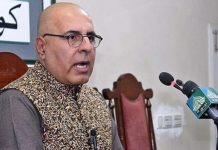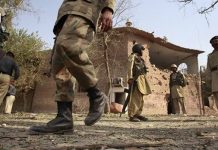Author: Zaarain Baloch
International Women’s Day came and went. It is a day when tens of thousands around the country come out on the roads to celebrate womanhood and to shed light on the issues facing women today, such as gender inequality, violence, harassment, lack of socio-economic opportunities, a lack of personal freedom, and many others. And it is also the time when we in the Baloch community wrestle with the question: Is a feminist movement imperative for Balochistan? Or is it just a fanciful illusion that distracts us from all the other issues the province faces?
The ongoing Feminist Movement in Pakistan was kickstarted in 2018 when, in a historical move, thousands of women took to the streets of Karachi to participate in what would become the first Aurat March. Their message was clear — women in Pakistan are victims of exploitation and oppression, and it is imperative that they be liberated from the shackles of patriarchy and allowed to live their lives on their own terms. These were very reasonable demands, considering that Pakistan at that time was the 8th worst in the world for women (it is 2nd now, after Afghanistan).
Pakistan is a diverse, multi-ethnic country, populated by dozens of communities divided along the lines of ethnicity, religion, and language. The problems that women around the country face are not entirely similar— in Sindh, for example, forced conversions of Hindu girls are a major issue; Punjab is notorious for honour killings; Khyber Pakhtunkhwa has its fair share of hardline clerics hellbent on imposing sharia law; and Balochistan… well it’s a mixture of everything.
Balochistan’s case is unique — on one hand, the problems facing Baloch women are the same problems that women around the country face, such as harassment, exploitation, oppression, and honour killings. Like the rest of the country, women in Balochistan are considered the property of their fathers, brothers, uncles, and husbands. They don’t have a say over their bodies or their lives. From the moment they breathe their first to the moment they breathe their last, Baloch women live under the constant guardianship of their male family members and relatives. The women who successfully break the shackles of patriarchy are a rare breed in Balochistan.
But on the other hand, there are problems unique to Baloch women that women in other communities of Pakistan cannot relate to, such as the enforced disappearances of their loved ones, allegedly at the hands of the security forces. Women in Balochistan regularly campaign for the safe return of the Baloch missing persons. In 2013, ten women, along with a few men and kids, walked months from Quetta to Karachi and then to Islamabad to draw attention to their plight. Undoubtedly, it was a telling feat of endurance and courage.
Today, Baloch women are at the forefront of the political movement for the release of thousands of missing persons. They lead rallies in major cities, run social media campaigns, and march alongside their male counterparts, chanting slogans of justice.
But if this gives the impression that Balochistan is a feminist utopia, my apologies because it is not. Balochistan is as conservative as any other region in Pakistan. Far from the media limelight, the reality of Baloch women is far grim. They live a life of oppression, exploitation, and victimization; their reproductive rights are infringed upon and inheritance rights usurped; they have no control over any decision in their lives; and they are treated less like a human and more like a commodity.
I will not be flooding these pages with statistics and reports on how oppressed women in Balochistan are, because God knows there are too many. Instead, I would be focusing on a subtle problem, one that I think lies at the heart of women’s issues in Balochistan. It is the unwillingness, especially on the part of the Baloch youth, to accept that, like the rest of the country, there is a patriarchal, misogynistic culture in Balochistan that restricts women’s rights.
I have had a few conversations with some of friends studying at different universities around the country. It is inevitable that a seemingly benign conservation over a cup of tea turns into a heated debate over the issues facing Balochistan today. In conversations like these, I have found myself alone in thinking that women in Balochistan are oppressed, underrepresented, and exploited, and a feminist movement is imperative to overthrow the patriarchy. Surprisingly, everyone else around me thinks this is a non-issue — women in Balochistan are doing great, and these ‘so-called feminist movements’, if they ever make it to Balochistan, would distract the people from more important matters, like the issue of enforced disappearances, and whatever it is that is happening in the mountains. To them, Balochistan is a utopia for women; it is every feminist’s wet dream.
In moments like these, I am left too nonplussed to say anything. I don’t understand how someone who has lived their entire life in Balochistan can claim that the women there have no problems. And even if they have any problems, they are artificial and created by the Pakistani state – the Baloch culture and history have nothing to with them. And this is not just any random “someone” who does not understand the history, culture, and day-to-day reality of Balochistan — he is, in his point of view, a ba-khabar (well-aware) and ba-shaoor (politically conscious) educated youth who aims to serve his people back home once he is done with his degree.
These educated Baloch youth eventually go on to form the backbone of Balochistan’s patriarchal culture. Even outside of Balochistan, they circle over the female Baloch students like vultures circling over a carcass. If you’re a Baloch woman planning to study outside the province, don’t assume you would escape the patriarchy. In your university, these folks would come to haunt you, because they consider themselves your waris (heir) — they believe they are morally responsible for protecting you and making sure you don’t stray too far off. They would surveil your every move — who you are friends with, where you spend your free time, who you talk to, and what you post on social media. The male guardianship you so desperately wanted to escape from will follow you wherever you go.
Baloch women are rarely seen in universities outside of Balochistan. In roughly every 100 Baloch students, one or two would be female. There are numerous reasons for this disparity — some parents can’t afford to send all of their kids to universities, and when it comes to choosing between educating a son and daughter, they always choose the son, as he would one day be the breadwinner of the family while the daughter would be married off and become someone else’s headache. Other parents are hesitant in sending their daughters out of their eyesight because “God knows what they would do once they are by themselves.”
A few fortunate Baloch women get the rare chance to escape the oppressive culture of their societies. I remember a friend who got admitted to a reputed university in Punjab on a scholarship. She gave me a perspective on how difficult it is for Baloch women to escape the shackles of patriarchy. Her waris at the university — members of the student council — told her she cannot sit with her non-Baloch classmates and friends, as it would dishonour not only her but also her family and the Baloch nation. They pestered her with messages and followed her every move. They knew where she lived, where she had her classes and even the cafe where she had her evening tea. And when she finally told them she would not toe their lines, she was kicked out of the council. She didn’t fit into their conception of what it means to be a Baloch woman because she did not believe she needed a guardian looking over her every move. They also made sure that every Baloch student from Peshawar to Islamabad knew what she had done. Ironically, these people then then go on to organize study circles and write articles on how great the Baloch women are doing!
This mindset — Baloch women are as free and independent as they can be — is not unique to the educated Baloch youth. Numerous Baloch activists, political workers, social workers, and some people who consider themselves journalists speak along the same lines. To them, the women who go out on the roads and demand the safe release of Baloch missing persons are heroes. They are symbols of resistance, the pride of the Baloch nation. And the women who reject their preconceived notions of Balochistan being a feminist utopia are liars and attention-seekers who want to paint Balochistan’s secular, women-friendly culture in a bad light. These people cannot accept the fact that women in Balochistan are vulnerable, because doing so would bring them into the same light as the Pashtuns, Sindhis, and Punjabis, a realization they cannot stomach. They think they are intellectually, historically, and culturally superior to the other communities in Pakistan. So when it comes to women’s rights, it is easier for them to say that, in the face of all the facts pointing otherwise, Baloch women enjoy the same status in society as Baloch men, than to accept they are not so different from others communities of Pakistan after all.
This, I believe, is a dangerous conception. The first step in solving any problem is accepting that it exists. We have to accept that in the tribal society of Balochistan, women are oppressed and exploited. They are considered the property of men – her shame is her father’s shame; her honour is her father’s honour. A man can do whatever he wants, but if a woman does not toe the lines set for her by her family and society, she pays a heavy price. In the Balochistan that I’ve lived my whole life in, an ideal woman is someone who endures violence and oppression without complaining about it.
Gender parity, women empowerment, ending domestic violence, and other feminist ideals are long-term goals that will require a continuous struggle of unprecedented magnitude. Ultimately, the Baloch women would have to lead the fight — they would have to come out on the roads and demand agency over their lives. The Baloch men would have to stand by their side and support them in this struggle. And the first step toward that end is accepting Baloch women are victims of anachronic, tribal norms designed specifically to keep them subdued.
I don’t expect anything from the Baloch elders in this regard — you cannot change the mind of a person who has been conditioned from childhood to believe that women are inferior to men. I believe the educated Baloch youth would have to step in and take responsibility because they are the architects of Balochistan’s tomorrow. They would have to take a step back from the patriarchal mindset and see things from the women’s perspectives. Those of us who are studying in major cities of Pakistan would have to accept that our fellow Baloch female students don’t always need our protection. We don’t have to surveil their every move, or tell them who they can befriend. We don’t have to be their waris all the damn time — they can be independent and do just fine on their own.
There is no denying that Baloch women are victims of state-sponsored violence. But they are also victims of the anachronic, patriarchal, and oppressive norms of their society. It is a fact we have to accept. The women who march on the streets in Quetta and Karachi, demanding the safe release of their loved ones, are heroes. And so are the women who rise against patriarchy and the oppressive culture of Balochistan. The least we, the educated Baloch youth, can do is stand by their side and support them in their struggle.
————
Disclaimer: The views and opinions expressed in this article are those of the author and do not necessarily reflect the official policy or position of The Balochistan Post or any of its editors.






























